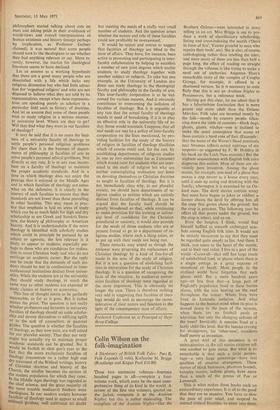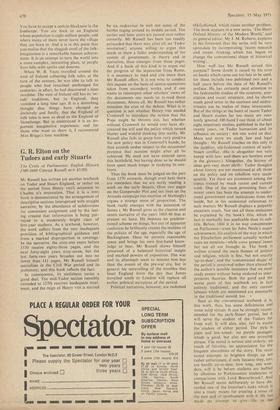Colin Wilson on the folk-imagination
These two enormous volumes—fourteen hundred pages in all—complete a four- volume work, which must be the most com- prehensive thing of its kind in the world. A review of the first two volumes, quoted on the jacket, compares it to the Arabian Nights; but this is rather misleading. The compilers of the Arabian Nights like the
Brothers Grimm—were interested in story- telling as an art. Miss Briggs is out to pro- duce a work of classificatory scholarship, listing and cross-indexing the motifs (`Devil in form of fox', 'Fairies grateful to man who repairs their tools', etc). She is also, of course, anthologising rather than retelling the tales; and since many of them are less than half a page long, the effect of reading on straight through the volumes is like trying to make a meal out of anchovies. Augustus Hare's
remarkable story of the vampire of Croglin Grange, for example, is offered in a shortened version. So it is necessary to state flatly that this is not an Arabian Nights or Pentarneron, but a reference book.
Having got this clear, let me admit that it has a labyrinthine fascination that is more potent and more adult than the Grimm Miirchen. Folk tales are invented mostly by
the folk—mostly by country people. Glan- cing down the table of contents—black dogs, ghosts, giants, witches—one is inclined to make the usual assumption that many of them contain a hard core of fact. (Example: that the name of the Worm's Head peninsula near Swansea reflects actual sightings of sea serpents—as suggested by F. W. Holiday in his book on the Loch Ness monster.) But the slightest acquaintance with English folk tales disproves this notion. Most of them are ob- viously pure invention. Among the ghost stories, for example, you read of a ghost that moves a step nearer to a house every year, until it ends up eating and drinking with the family; whereupon it is exorcised by an Ox- ford man. The devil stories contain many that must have begun as jokes or riddles; a farmer cheats the devil by offering him all the crop that grows above the ground; but the crop is potatoes. The following year he offers all that grows under the ground, but the crop is wheat, and so on.
Even the Jungian, I think, would find himself baffled to unearth archetypal sym- bols among English folk tales. It would not be entirely inaccurate to say that they must be regarded quite simply as lies. And there, I think, you come to the heart of the matter, and to their real value. I live in a part of the world—Cornwall—that still has large tracts of uninhabited land, or places where there is a single cottage in a great expanse of moorland or heath. Most people in the civilised world have forgotten that such places exist. But a mere hundred years ago—or less than that—a large part of England's population lived in these barren places, with the rain beating on the roof throughout the winter. Whole lives were lived in Icelandic isolation. And what happens to the human mind when its pace is slowed down to the pace of the seasons, when there are no football pools or television, but only the changing colours of the trees? Inevitably, it remains fixed at a fairly child-like level. But the human craving for strangeness, for 'other-ness', manifests itself purely as invention.
A great deal of this invention is as unimaginative as the tall stories children tell one another to gain status. But what is so remarkable is that such a large percen- tage—a very large percentage—have real qualities of creative strangeness. These stories of black huntsmen, phantom hounds, vampire worms, sadistic giants, have more than a touch of the genius of Poe or Lovecraft.
This is what makes these books such an extraordinary experience. It is all to the good that they are so massive. You have to slow the pace of your mind, and suspend its normal critical faculties, to enter into them. You have to accept a certain bleakness in the landscape. You are back in an England whose population is eight million people, and where many of them never leave the village they are born in. And it is at this point that you realise that the sluggish swell of the folk- imagination is a remarkable human achieve- ment. It is an attempt to turn the world into a more complex, interesting place, to people bare hills with spirits and demons.
When W. B. Yeats travelled around the west of Ireland collecting folk tales, at the turn of the century, he was able to talk to people who had remained unchanged for centuries; in effect, he had discovered a time machine. The west of Ireland still has its 'oc- cult' traditions, but in England, they vanished a long time ago. It is a disturbing thought that things have changed so decisively and finally, that the England of folk tales is now as dead as the England of Stonehenge. But to understand it is an im- portant imaginative experience; and for those who want to share it, I recommend Miss Briggs's time machine.







































 Previous page
Previous page